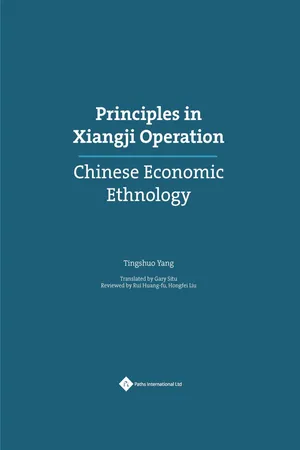
- 645 pages
- English
- PDF
- Available on iOS & Android
About this book
This book is one of the most important works about earlier systematical theoretical analysis on economic anthropology theories in China. It is a milestone in growth process of Chinese economic anthropology. It focuses on cross-culture background, histories and spatial differences in different ethnic groups' economic activities. In this book, the author uses the Chinese character of "xiang" to refer to the social and natural entity regulated by the system composed of non-economic restraints that impact economic activities across different ethnic regions. It attempt to reveal the essence of cross-xiang economic activities, factors that cause cross-xiang economic activities to succeed or fail, as well as the solutions to the problems encountered in cross-xiang economic activities. Whoever led the development faced the same question, i.e., the development activities were carried out in a quite different natural environment by applying the Han culture in different cultural settings. These facts have prompted special theoretical problems that are related to differences in both the natural environment and culture. Such problems cannot be solved exclusively by either economic or cultural anthropological measures, but rather by economic anthropology- an interdisciplinary subject between cultural anthropology and economics.
Frequently asked questions
- Essential is ideal for learners and professionals who enjoy exploring a wide range of subjects. Access the Essential Library with 800,000+ trusted titles and best-sellers across business, personal growth, and the humanities. Includes unlimited reading time and Standard Read Aloud voice.
- Complete: Perfect for advanced learners and researchers needing full, unrestricted access. Unlock 1.4M+ books across hundreds of subjects, including academic and specialized titles. The Complete Plan also includes advanced features like Premium Read Aloud and Research Assistant.
Please note we cannot support devices running on iOS 13 and Android 7 or earlier. Learn more about using the app.
Information
Table of contents
- Front Cover
- Title Page
- Table of Contents
- Preface
- Chapter One: Introduction
- Chapter Two: Development (Kai Fa)
- Chapter Three: Culture (Section I)
- Chapter Four: Culture ( Section II )
- Chapter Five: Culture (Section III)
- Chapter Six: Background
- Chapter Seven: Capacity
- Chapter Eight: Policy
- Chapter Nine: Solutions
- Chapter Ten: Case Studies
- Closing Notes
- Epilogue
- Bibliography
- Copyright